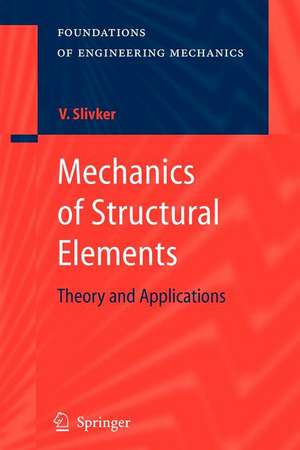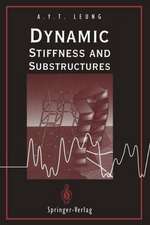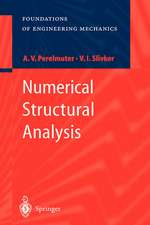Mechanics of Structural Elements: Theory and Applications: Foundations of Engineering Mechanics
Autor Vladimir Slivkeren Limba Engleză Paperback – 22 noi 2010
| Toate formatele și edițiile | Preț | Express |
|---|---|---|
| Paperback (1) | 1241.25 lei 6-8 săpt. | |
| Springer Berlin, Heidelberg – 22 noi 2010 | 1241.25 lei 6-8 săpt. | |
| Hardback (1) | 1247.88 lei 6-8 săpt. | |
| Springer Berlin, Heidelberg – 23 oct 2006 | 1247.88 lei 6-8 săpt. |
Din seria Foundations of Engineering Mechanics
- 15%
 Preț: 585.26 lei
Preț: 585.26 lei - 18%
 Preț: 1112.30 lei
Preț: 1112.30 lei - 18%
 Preț: 786.36 lei
Preț: 786.36 lei - 15%
 Preț: 650.55 lei
Preț: 650.55 lei - 15%
 Preț: 646.11 lei
Preț: 646.11 lei - 18%
 Preț: 948.47 lei
Preț: 948.47 lei - 18%
 Preț: 956.69 lei
Preț: 956.69 lei - 15%
 Preț: 643.34 lei
Preț: 643.34 lei - 18%
 Preț: 948.47 lei
Preț: 948.47 lei - 18%
 Preț: 953.82 lei
Preț: 953.82 lei - 18%
 Preț: 951.29 lei
Preț: 951.29 lei - 18%
 Preț: 1386.62 lei
Preț: 1386.62 lei - 15%
 Preț: 644.49 lei
Preț: 644.49 lei - 18%
 Preț: 2117.76 lei
Preț: 2117.76 lei - 18%
 Preț: 951.91 lei
Preț: 951.91 lei - 18%
 Preț: 957.62 lei
Preț: 957.62 lei -
 Preț: 391.99 lei
Preț: 391.99 lei - 18%
 Preț: 1223.43 lei
Preț: 1223.43 lei - 18%
 Preț: 1213.46 lei
Preț: 1213.46 lei - 15%
 Preț: 634.32 lei
Preț: 634.32 lei - 15%
 Preț: 644.30 lei
Preț: 644.30 lei - 18%
 Preț: 952.26 lei
Preț: 952.26 lei - 15%
 Preț: 646.11 lei
Preț: 646.11 lei - 15%
 Preț: 641.71 lei
Preț: 641.71 lei - 15%
 Preț: 635.01 lei
Preț: 635.01 lei - 18%
 Preț: 955.25 lei
Preț: 955.25 lei - 18%
 Preț: 1234.46 lei
Preț: 1234.46 lei - 20%
 Preț: 1289.59 lei
Preț: 1289.59 lei - 18%
 Preț: 952.89 lei
Preț: 952.89 lei - 18%
 Preț: 1247.88 lei
Preț: 1247.88 lei - 18%
 Preț: 947.18 lei
Preț: 947.18 lei - 15%
 Preț: 631.21 lei
Preț: 631.21 lei - 18%
 Preț: 1231.16 lei
Preț: 1231.16 lei
Preț: 1241.25 lei
Preț vechi: 1513.71 lei
-18% Nou
Puncte Express: 1862
Preț estimativ în valută:
237.59€ • 258.16$ • 199.70£
237.59€ • 258.16$ • 199.70£
Carte tipărită la comandă
Livrare economică 21 aprilie-05 mai
Preluare comenzi: 021 569.72.76
Specificații
ISBN-13: 9783642079498
ISBN-10: 3642079490
Pagini: 816
Ilustrații: XXVII, 787 p.
Dimensiuni: 155 x 235 x 43 mm
Greutate: 1.12 kg
Ediția:Softcover reprint of hardcover 1st ed. 2007
Editura: Springer Berlin, Heidelberg
Colecția Springer
Seria Foundations of Engineering Mechanics
Locul publicării:Berlin, Heidelberg, Germany
ISBN-10: 3642079490
Pagini: 816
Ilustrații: XXVII, 787 p.
Dimensiuni: 155 x 235 x 43 mm
Greutate: 1.12 kg
Ediția:Softcover reprint of hardcover 1st ed. 2007
Editura: Springer Berlin, Heidelberg
Colecția Springer
Seria Foundations of Engineering Mechanics
Locul publicării:Berlin, Heidelberg, Germany
Public țintă
ResearchCuprins
Basic Variational Principles of Static and Geometry in Structural Mechanics.- Basic Variational Principles of Structural Mechanics.- Additional Variational Principles of Structural Mechanics.- Particular Classes of Problems in Structural Mechanics – Part 1.- Particular Classes of Problems in Structural Mechanics – Part 2.- Particular Classes of Problems in Structural Mechanics – Part 3.- Particular Classes of Problems in Structural Mechanics – Part 4.- Particular Classes of Problems in Structural Mechanics – Part 5.- The Ritz Method and its Modifications.- Variational Principles in Spectral Problems.- Variational Principles in Stability/Buckling Analysis.
Recenzii
From the reviews:
"The book is indented for the self-contained reference for the topic, and is aimed at practicing engineers and researchers in the field of mechanics of solids. Graduate, postgraduate and doctoral students of mechanical engineering could benefit from using the book as well. … This well-written and organized book is a reader-friendly and good-organized manual in the field of variational approaches. It can be highly recommended for experts in mechanics of solids, engineers and for graduate, postgraduate and doctoral students." (Igor Andrianov, Zentralblatt MATH, Vol. 1107 (9), 2007)
"The book is indented for the self-contained reference for the topic, and is aimed at practicing engineers and researchers in the field of mechanics of solids. Graduate, postgraduate and doctoral students of mechanical engineering could benefit from using the book as well. … This well-written and organized book is a reader-friendly and good-organized manual in the field of variational approaches. It can be highly recommended for experts in mechanics of solids, engineers and for graduate, postgraduate and doctoral students." (Igor Andrianov, Zentralblatt MATH, Vol. 1107 (9), 2007)
Textul de pe ultima copertă
The book systematically presents variational principles and methods of analysis for applied elasticity and structural mechanics. The variational approach is used consistently for both, constructing numerical procedures and deriving basic governing equations of applied mechanics of solids; it is the derivation of equations where this approach is most powerful and best grounded by mathematics. The book is oriented towards experts in civil engineering, researchers, developers of software for mechanical strength, stability, and oscillation analysis; it can be used by practical engineers who employ software tools to do their job and who want to know more about the theoretical background of the strength analysis. The book will be useful to senior and postgraduate students of engineering, to professors of structural analysis at civil or mechanical engineering departments of technical universities.
Caracteristici
The author systematically uses the variational principle where it is most powerful – constructing numerical procedures and deriving basic governing equations of applied mechanics of solids Includes supplementary material: sn.pub/extras



















